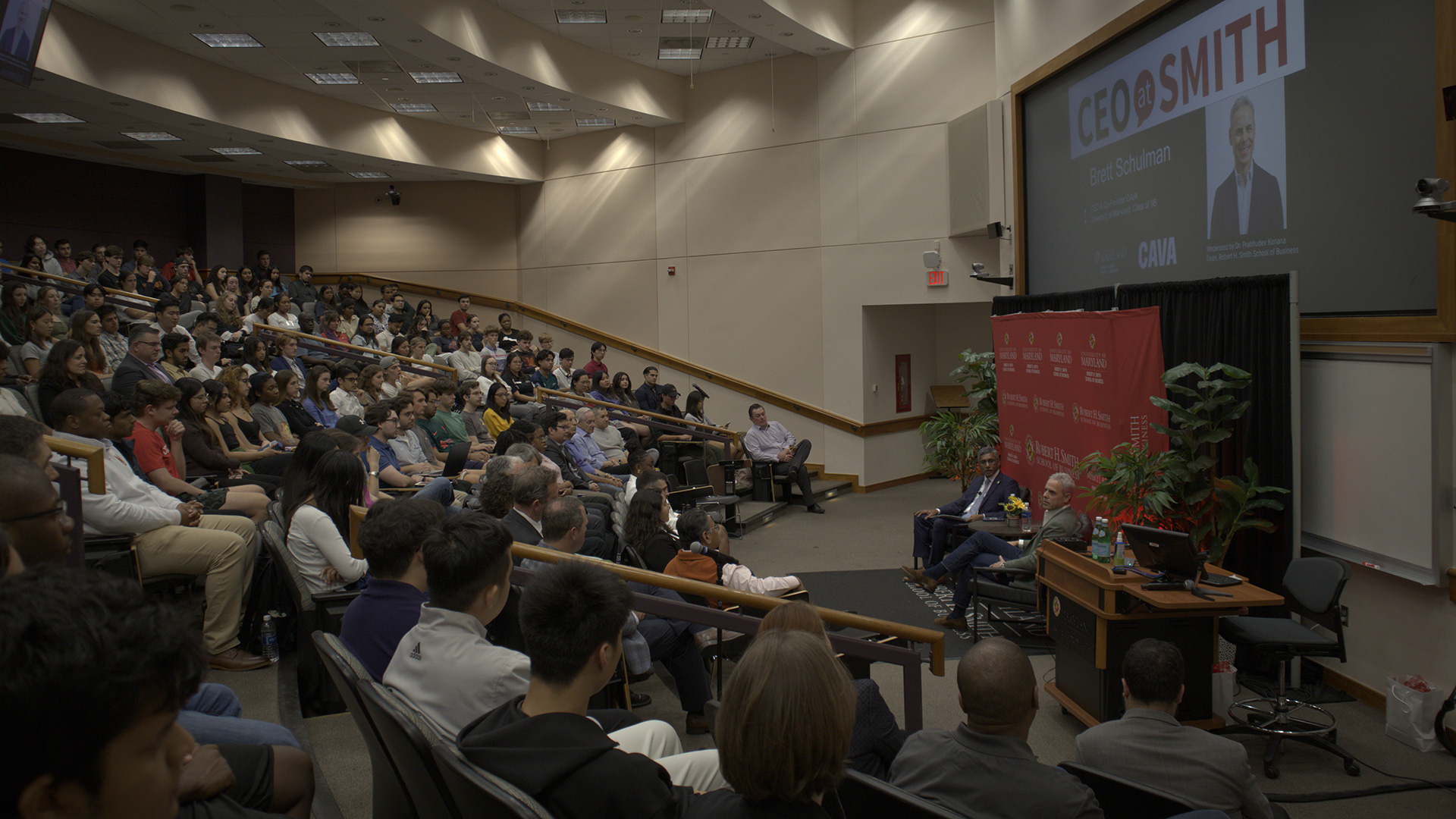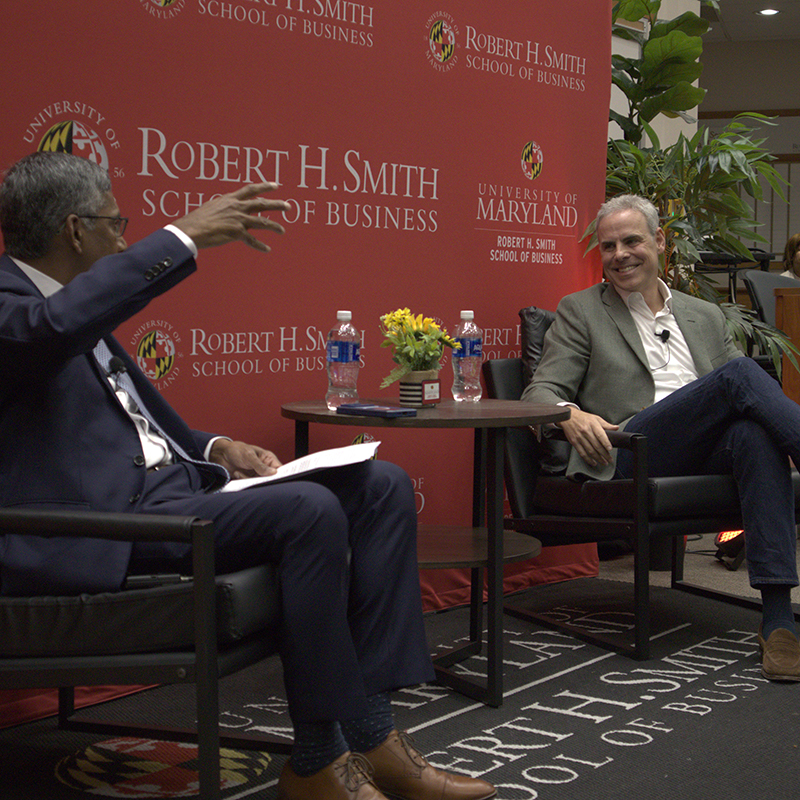
From opening the doors of its first fast-casual restaurant in Bethesda, Maryland, in 2011 to celebrating the company’s entry into the New York Stock Exchange 12 years later, Cava CEO and co-founder Brett Schulman, UMD ’95, has kept the same three values at the forefront—heart, health and humanity.
 On Wednesday, Nov. 6, Schulman recounted the fast-casual Mediterranean chain’s rapid ascension in the restaurant industry ranks during the latest CEO at Smith event. During the event hosted by the University of Maryland’s Robert H. Smith School of Business, Schulman conversed with Smith School Dean Prabhudev Konana in front of an audience of students and faculty at Van Munching Hall.
On Wednesday, Nov. 6, Schulman recounted the fast-casual Mediterranean chain’s rapid ascension in the restaurant industry ranks during the latest CEO at Smith event. During the event hosted by the University of Maryland’s Robert H. Smith School of Business, Schulman conversed with Smith School Dean Prabhudev Konana in front of an audience of students and faculty at Van Munching Hall.
Throughout the evening, Schulman shared stories about his career journey, including his pivot from investment banking to the food packaging and restaurant industries. He also shared lessons on overcoming adversity while scaling Cava into a nationally recognized brand and offered his general perspectives on trends in the business world.
Here are five bite-sized insights from the restauranteur:
Culture is the catalyst for everything. Schulman described Cava’s culture as one born out of the company’s original full-service Mediterranean restaurant, which was established with an emphasis on hospitality and the idea that everyone is welcome at their table. He said the company measures its culture like every other aspect of its business operations.
That tracking helped refine the company’s culture during its growth and spawned its MVC—mission, values and competencies. Cava’s values, Schulman noted, are a passion for positivity, generosity, first, always, constant curiosity and act with agility. Its competencies include a service mindset, enterprise leadership, diversity cultivation and accountability.
“We work very hard to permeate those ideas throughout our organization in different ways because it’s not ‘set and forget,’ it’s a constant work in progress,” said Schulman. “I use the line: a happy team equals a happy guest, which equals a happy profit and loss statement. Those financial results are a byproduct of that work.”
Curiosity is a skill worth cultivating. Schulman believes today's students can focus on asking the right questions and honing critical thinking skills during their education to set themselves up for success in the business world. With Cava, Schulman talked about his site visits to locations across the country, where he asked for operational feedback from team members to help eliminate complexities and empower them to deliver on financial goals with less effort.
One example stemmed from several of his conversations in which line workers expressed arm fatigue from slicing onions. Schulman immediately worked with the company’s produce supplier to get vacuum-sealed, pre-sliced onions that could then be pickled in–house, reducing the strain on employees while maintaining the company’s high standard of food quality.
“We have this acronym called CIA—customers, investors and associates. Every decision we make has to check all those boxes,” said Schulman. “If we’re doing something, it has to be right for our guests and team members and add value to the business. If you’re checking those boxes, I haven’t seen it return a bad outcome yet.”
Use data to enhance, not replace, experiences. Cava’s continued expansion includes a goal of operating in 1,000 locations by 2032. Since opening in 2011, Schulman maintains that Cava has continuously embraced and successfully integrated digital tools and platforms into its business model. According to Schulman, the company was one of the first to establish a mobile payment loyalty application, an early adopter of dedicated food assembly lines for online orders and ahead of the curve with digital drive-through pickup lanes. Today, he said 35% of Cava’s revenue utilizes those processes, accounting for over $300 million in revenue.
To reach the goal Schulman and the Cava executive leadership have installed, he said the company must embrace artificial intelligence and data to “enhance the human experience” of its customers rather than replace experiences altogether. One example is the perceived demise of dining room experiences, which Schulman said is “greatly exaggerated” and a reason why Cava customers shouldn’t expect to see an automated serving line in stores.
“Sharing a meal is the oldest social act known to humankind, and I don’t think that’s going away,” said Schulman. “What I don’t want our brand to become is a cold, tech-oriented brand where you walk in, pick something off the shelf and walk away. I don’t know how you build emotional connections with your guests if that’s your experience at every Cava location.”
Emotional resiliency is critical in today’s business environment. In 2018, Schulman oversaw Cava’s acquisition of Zoe’s Kitchen and its roughly 250 locations across the United States. He and his executive team were essentially “firefighting” throughout the subsequent year as they worked to convert those locations into Cava restaurants.
The first conversion, a White Marsh, Maryland location, initially operated at break-even with $25,000 a week in revenue. Schulman said he received a “real shot of confidence” once the conversion was complete, as the restaurant eventually doubled its weekly revenue. The following year, as the COVID-19 pandemic emerged, Schulman and his team didn’t panic and instead trusted the recent lessons learned and experience gained to successfully continue growing the company amid a global crisis.
“You learn so much more through your adversity than you do your success, and it allows you to achieve those successes. I think emotional resiliency is probably the single, most important competency in the modern world,” said Schulman. “The world is more fluid and unpredictable. You have to be resilient and adjust in the face of uncertainty.”
Positive people make for great leaders. Understanding how to manage people is a valuable skill, and the same goes for having the knack to identify the right people to lead a business. Throughout his career, Schulman has encountered team members who excel at executing their roles but struggle in managerial positions. At Cava, he has found success in promoting or hiring individuals who enjoy engaging socially, display a willingness to learn and who are positively biased.
“I say it's really easy to teach a positive person to do anything, but it's really hard to teach a negative person to be positive,” said Schulman. “It's the folks who figure out how to overcome adversity that wind up going on to do great things.”
Media Contact
Greg Muraski
Media Relations Manager
301-405-5283
301-892-0973 Mobile
gmuraski@umd.edu
About the University of Maryland's Robert H. Smith School of Business
The Robert H. Smith School of Business is an internationally recognized leader in management education and research. One of 12 colleges and schools at the University of Maryland, College Park, the Smith School offers undergraduate, full-time and flex MBA, executive MBA, online MBA, business master’s, PhD and executive education programs, as well as outreach services to the corporate community. The school offers its degree, custom and certification programs in learning locations in North America and Asia.